
-11-08-2021-
Nineteenth Sunday in Ordinary Time
Gospel reading: John 6:41-51
vs.41 The Jews were complaining to each other about Jesus, because he had said, “I am the bread that came from heaven.”
vs.42 “Surely this is Jesus son of Joseph“ they said. “We know his father and mother. How can he now say, ‘I have come down from heaven’?”
vs.43 Jesus said in reply, “Stop complaining to each other.
vs.44 No one can come to me unless he is drawn by the Father who sent me, and I will raise him up at the last day.
vs.45 It is written in the prophets: ‘They will all be taught by God,’
and to hear the teaching of the Father, and learn from it, is to come to me.
vs.46 Not that anyone has seen the Father, except the one who comes from God; he has seen the Father.
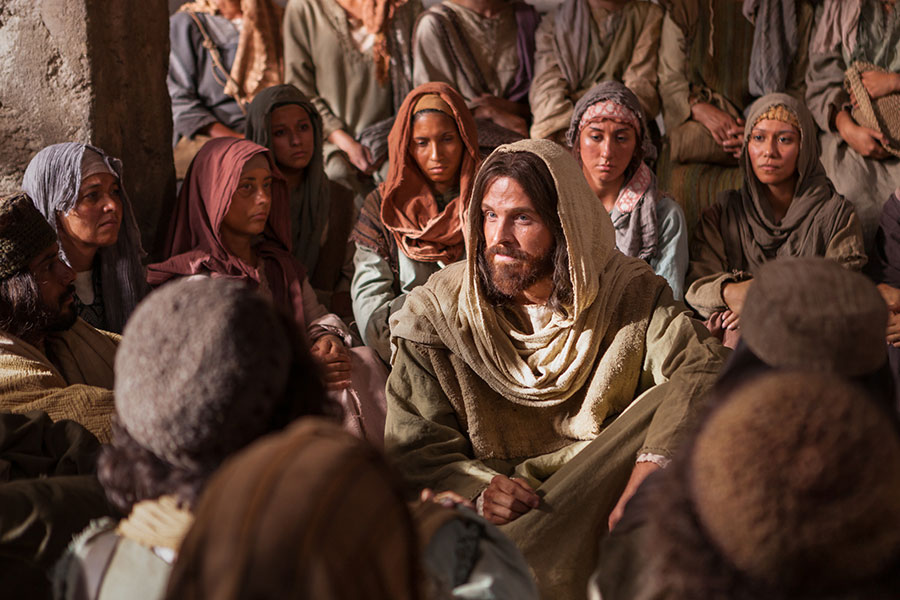 vs.47 I tell you most solemnly, everybody who believes has eternal life.
vs.47 I tell you most solemnly, everybody who believes has eternal life.
vs.48 I am the bread of life.
vs.49 Your fathers ate the manna in the desert and they are dead;
vs.50 but this is the bread that comes down from heaven, so that a man may eat it and not die.
vs.51 I am the living bread which has come down from heaven.
Anyone who eats this bread will live for ever;
and the bread that I shall give is my flesh, for the life of the world.”
*******************************************
We have three commentators available from whom you may wish to choose .
Michel DeVerteuil :Holy Ghost Priest, late director of the Centre of Biblical renewal. Trinidad W.I.
Thomas O’Loughlin: Professor of Historical Theology University of Nottingham NG7 2RD
Sean Goan:Studied Scripture in Rome, Jerusalem and Chicago
Donal Neary SJ: Editor of The Sacred Heart Messenger and National Director of The Apostlship of Prayer.
****************************************
Michel DeVerteuil
Lectio Divina with the Sunday Gospels
www.columba.ie
Textual Comments
In this passage, Jesus again draws lessons about life from the feeding of the five thousand.
I remind you that all teaching of Jesus recorded in the gospels is intended to speak to experience, and we must therefore appeal to our experience to discover its truth. This can be difficult with passages like these: one reason is that the language is not the kind that we use ordinarily. Some expressions – such as “eternal life,” “being drawn by the Father,” “living bread,” “flesh” – you will have to bring down to earth for yourself, applying them to what you have lived yourself.
There is, however, a more important reason why we may find this passage difficult to relate to experience: it contains deep teaching, speaking of a level of experience that we seldom reflect on because we all tend to live at the surface of ourselves.
In meditating on these passages then, you must remember deep experiences. You will naturally think of deep conversion
*for example, a retreat that changed your life,
* a Life in the Spirit Seminar, or
*a prayer moment that you have never forgotten.
But you need not stay with prayer moments.
could think of other deep experiences i.e.
* a religious movement or
*a leader who touched your life.
The passage will help you understand these experiences and put them in the context of your growth as a person.
As always with gospel stories, you can focus on the person of Jesus, letting him remind you of someone very important to you and in the process,
of the kind of person you yourself would like to be;
or then you can focus on the journey the people were called to make, recognizing a journey that you or people you love are making or have made.
Remember also that the fruit of your meditation is that you find yourself repeating the actual words of the passage prayerfully and with great gratitude to God for his grace.
It is not possible to meditate deeply on a passage like this all together – divide it up and take one section at a time. You will usually find that one section is all you can go into over a week, although you may be able to connect the other sections after a time. I would suggest dividing the passage as follows:
– Verses 41 to 44 describe a journey that Jesus invites the people to make.
– In vs. 41 and 42 they are ‘complaining‘: their lives are so ordinary that God could not possibly be with them. All they can see is ‘the son of Joseph‘ whose father and mother ‘they knew’.
– In vs. 43 and 44 Jesus asks them to look beyond that same ordinary reality and recognize two things:
a) that the meeting with him is not by chance but by God’s grace; and
b), that it is a meeting that has great significance, not merely here and now, but for all eternity.
What encounter in your own experience resulted in your making that kind of journey? What kind of leader is able to challenge people to make such a journey?
– Verses 45 and 46 speak of a similar journey, this time as one of ‘hearing‘ or ‘being taught‘ or ‘learning‘. We can know right teaching, but in an abstract way; when we come to Jesus, we learn God’s lessons personally as if he had taken us aside and given us individual tutoring. Identify a moment when you made that journey and who was the Jesus you ‘came to‘.
Verse 46 makes an interesting comment on the process:
we don’t have to have seen God, only the one who came from God.
– Verse 47. Take this verse by itself, as a reflection on a fact of life. ‘Believes‘ is left vague, and so you are free to take it in as wide a sense as you want, of any act of faith. On the other hand, you can also take it to refer to real faith.
Think of people who have risked their lives, their careers or friendships for the sake of non-violence or for the liberation of oppressed people, or for honesty.
Remembering them, you gradually discover the meaning of ‘having eternal life‘ and you will feel a kind of awe as he reflected on the power of that kind of faith, ‘I tell you most solemnly’.
Remember world-famous people, but don’t limit yourself to them: remember members of your own family or your village community.
A negative way of appreciating this powerful verse would be to reflect on the emptiness of a life without faith.
“If a man has not discovered something that he will die for, he isn’t fit to live” (…Martin Luther King, Jnr).
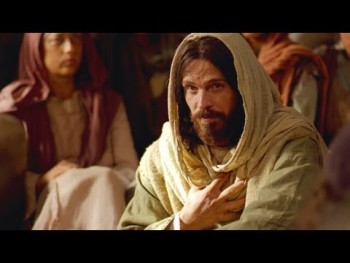
Yes, you are hearing right. Me, ‘I am the bread of life.
– In verses 48 to 50
Jesus speaks of himself as bread. This is a metaphor that is quite frequent in the Bible to describe the teaching of a leader.
Jesus makes a distinction between two kinds of teacher or leader. There are those who when they find people in the wilderness are content to give them manna after which they die.
Jesus is a different kind of teacher: through his teaching people are set free from within themselves so that they live. His teaching gives unlimited depth to a person’s life.
– In verse 51 the teaching is repeated but Jesus makes a new point which he will make clearer in the following passage: the bread he gives is his flesh. Make sure you bring this expression down to experience. ‘Flesh‘ in Bible language means various things. Here it clearly stresses that Jesus is a source of life by giving himself, not abstract teaching but his own self-sacrificing love. The word goes deeper and says that Jesus did not give himself in power but in weakness, and this of course is a tremendous lesson about giving life to others.
Prayer Reflection
Lord, we often complain about
– our bad health, our failures
– the friends who let us down, our parish community
– society today with its materialism, its selfishness, its crimes.
How can anybody say that you are with us?
But Jesus tells us to stop complaining;
unless you were drawing us we would not be where we are.
The people we live with, the situations we find ourselves in,
all are your gift to us and they can raise us up to your presence.
In fact they can raise us up on the last day.
“Our prayer has had a beginning because we have had a beginning.
But it will have no end. It will accompany us into eternity
and will be completed in our contemplation of God.” …Carlo Carretto
Lord, we thank you for moments of deep prayer;
we can only come to them because you draw us there
and we know that they will take us beyond the last day.
Lord, we thank you, those of us who preach the Word,
for calling us to be part of this mystery.
People are there, listening to us as they listen to other speakers,
but they cannot really come to us unless you draw them.
On the other hand, those words of ours, poor though they may be,
can raise them up so high
that they are beyond the reach of death and of all that can harm them.
Lord, we have known Jesus all our lives,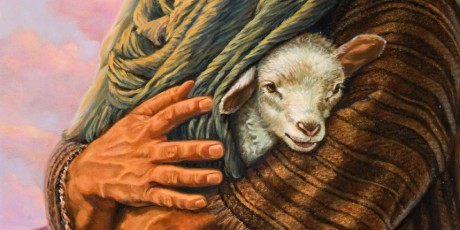
but for a long time he was someone far away who taught abstract truths.
Then, one day, we experienced conversion and it was as if we understood life for the first time.
We understood, then, what was written in the prophets: “They will all be taught by God to trust in Him.”
Teachings that had seemed abstract we now heard addressed personally to us,
and we really learned from them.
That is what it means to come to Jesus. We know that no one has seen you, Father but we have met the one who came from you and has seen you.
“Gandhi’s impact is not measured over two years, or four years or twenty years; the ideas he has given us are imperishable.” …A disciple of Gandhi
Lord, how true it is that one who believes has an eternal life.
When we put our trust in absolute values
– truth, justice, the equality of all men and women, the care of little ones
we are taken out of ourselves, out of our present history and become part of eternity.
Lord, many people take it for granted that their destiny is to be inferior to others;
they are convinced that
– they will always fail,
– they will never overcome their faults,
– they will remain forever in bondage.
There are leaders who encourage this attitude, content to give people bread in the wilderness and let them die there.
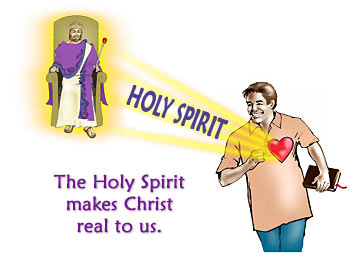 Lord, send us leaders, spiritual guides, like Jesus
Lord, send us leaders, spiritual guides, like Jesus
who will give us a different kind of teaching,
feeding us with another kind of bread,
one that comes from you,
and help us to experience that we have it within us to be free and creative,
that we are born not to die in bondage but to live free forever.
Lord, our culture leads us to think that people can only help others
by their power, their wealth or their achievements.
We have even come to think that Jesus helped people like that.
But the bread that he gave others to eat was his weakness, his flesh:
– he made himself vulnerable to children
– he asked the woman at the well for water and Zacchaeus for hospitality
– on the cross he was so human, so much ‘flesh’
that the good thief could speak words of encouragement to him.
It is by sharing our weakness that we give life to others.
Lord, we thank you for our mothers: they gave us their flesh that we might live.
Lord, our churches are big and beautifully decorated, with imposing statues.
But the heart of all is Jesus under the form of simple bread.
It is still true that he gives his flesh for the life of the world.
Lord, we pray for our leaders, in the Church and in the State.
Teach them that they cannot give life to others by their words,
but only by giving us their flesh to eat as Jesus did.
******************************
Thomas O’Loughlin
Liturgical Resources for the Year of Matthew
www.columba.ie
Introduction to the Celebration
In today’s gospel we hear Jesus describe himself as
‘the living bread that comes down from heaven,
anyone who eats this bread will live forever.’
We have gathered here around this table so that he can share with us his Living Bread. We have gathered for his meal at which his food is his own life:
life that he shared with us to sustain our lives as children of our heavenly Father.
Homily Notes

1. It is tempting to think of being a Christian in terms of striking a ‘deal‘ with God. I, for my part, will do this and that, these actions will show that I trust in God, ‘love God‘ (whatever that means), and profess that I believe all things I ought to believe (just tell me what I am to believe and I will do it —and if you want me to sign something to that effect, I will do it!). If I do all this, then God will reward me with eternal life, or, at the very least, stop me going to a place of ‘eternal punishment‘.
We, preachers, have often connived with this sort of presentation of faith: its simplicity as a piece of communication for the ‘simple faithful’ seemed to justify its blasphemy of placing God and the creature on a single plane of commutative justice. It was connived at in little ‘pious practices’ which were let be understood without any of the subtle distinctions found in learned books in Latin. The practice of ‘the Nine [First] Fridays’ was one such: if you did these, then it was understood you would not die without a priest; and then once the priest got to you, you could confess, be absolved, and everything would end up all right.
In this sort of presentation, faith is a ‘deal‘ rather than a relationship; it is something that occurs at fixed moments in the way one visits a service station rather than a pilgrimage; it is on the edges of ordinary life rather than at life’s core; and it is an individual matter of survival rather than relating to the whole community of the People of God.
2. So the first task in getting a congregation to hear today’s gospel is to try to alert them to how we all fall into these false images in relationship with God.
We all, to a greater or lesser extent, tend towards:
• reducing faith to doing a deal with God;
• reducing faith to fixed moments in life;
• reducing faith to being peripheral to life;
• and reducing faith to being a matter of individual survival.
3. Then the task is to see how Jesus presents the relationship of being a Christian in today’s gospel.
• The Father has not struck a deal with us, but in his love has sent his Son among us: we are called to a relationship of love with God.
• A relationship with God is on-going: he loves us at all times and without exception, so we cannot think of ‘holy moments‘ and ‘ordinary moments’: God’s love abounds and envelops every aspect of our lives. Jesus, the Son of the Father, has come among us and lives with us as one of us.
• Jesus is the Bread of Life: it is he who sustains us throughout our pilgrimage of life.
• It is a community that ate the manna in the desert, and it is a community that is sustained by Christ the Bread of Life – this is why we gather and we pray and we eat and we drink.
4. Discovering the whole extent of God’s loving involvement in our lives is the task as great as life itself. We can never fully grasp this mystery while we live; but we must be careful never to betray it by reducing that life-long and life-giving relationship to miserable meanness of human dealings.
5. We can grasp the horror of reducing faith to commerce by noting how jarring this sentence is:’ The Lord has come offering life in abundance, Love’s gift; he did not come selling tickets for places in a life-boat!
**********************************
Sean Goan
Let the reader understand
www.columba.ie
Gospel
One of the techniques used frequently in the gospel of John is that of misunderstanding. In the case of Nicodmeus and the Samaritan woman they misunderstand his words about being born again (3:4) and living water (4:15) and this leads to further revelation or explanation by Jesus.
Now those who hear Jesus saying that he is the bread of life come down from heaven fail to grasp the significance of the statement and insist that they know where he is from. Jesus, however, continues with his revelatory discourse and shows how he is indeed the one sent by God to give life. To believe in Jesus is come to life, a life that never ends. We come to this life through believing in Jesus who offers his life (flesh) for the sake of the world. Until now, in using the symbol of bread the focus has been on believing in who Jesus is, but with the change in language from bread to flesh there will be a shift in meaning towards a reflection on his death on the cross and the Eucharist. The gospel of John does not make for easy reading because of its layers of meaning and great depth but it offers great inspiration if we but try.
Reflection
 We are invited on the first reading, to recognise ourselves in the Elijah story as people who, if they are to be faithful on the journey, need to be sustained. We can easily become dispirited either at our own shortcomings or at the failings of others. However, as we are often reminded in the scriptures, we must learn to rely not only on our own resources but on the guiding presence of God that directs our life. It is probably true to say that it is almost a necessity in our journey of faith that we come to a low point. In the biblical tradition and in that of the church, all the heroes and heroines come to a stage where they too have to acknowledge their own weakness and utter dependence on God. This does not come easily to us because it can seem like failure. That is when we need to remind ourselves of what the Lord said to Paul: ‘My grace is sufficient for you, for power is made perfect in weakness.’ (2 Cor 12:9)
We are invited on the first reading, to recognise ourselves in the Elijah story as people who, if they are to be faithful on the journey, need to be sustained. We can easily become dispirited either at our own shortcomings or at the failings of others. However, as we are often reminded in the scriptures, we must learn to rely not only on our own resources but on the guiding presence of God that directs our life. It is probably true to say that it is almost a necessity in our journey of faith that we come to a low point. In the biblical tradition and in that of the church, all the heroes and heroines come to a stage where they too have to acknowledge their own weakness and utter dependence on God. This does not come easily to us because it can seem like failure. That is when we need to remind ourselves of what the Lord said to Paul: ‘My grace is sufficient for you, for power is made perfect in weakness.’ (2 Cor 12:9)
******************************************
Food for Now and Eternity
Elijah needed both food for the body and soul, for forty days which in the Hebrew Testament is a symbolic number for a journey of the soul.
Food for the soul can become prayer, a good chat at a bad moment, the Mass. Culture, art, music, prayer to feed the soul. The bread of life of Jesus is both Holy Communion and other nourishment for the soul.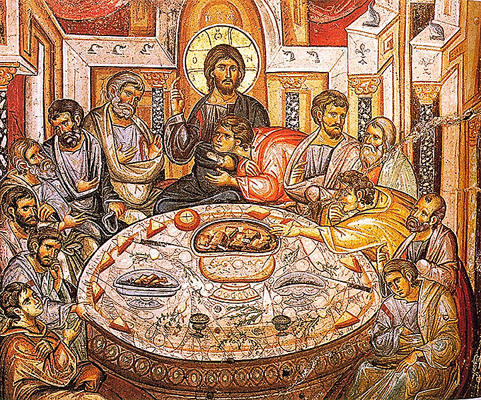
Teilhard de Chardin writes: ‘We are spiritual beings on a human journey’. This means that at our deepest we are spiritual. Our essence is from God and for God, and the journey is human. Both are one.
In all of this is the presence of Jesus. The one who is our bread of life, and through us he feeds others in many ways. In receiving the bread of life we commit ourselves to being ‘Eucharist People’ offering the love and compassion of God to the world.
Sometimes we have to wait, and maybe sift through different moods. In the awaiting is the feeding. We are being fed all the time by God, and sometimes we don’t notice. The Eucharist is the summit of other feedings and meals.
Our hopes of life after death and our resurrection give the food that always lasts. At the time of death we need reminders of meeting God in the next life!
We might picture people in great need
– of food, of meaning in life, of hope.
Pray for them offering to bring food
for body and soul when we can.
Give us this day our daily bread, O Lord.
*********************